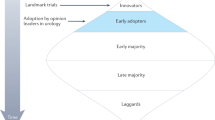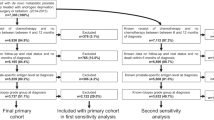Abstract
The last few years have seen considerable evolution in treatment options and therapeutic strategies for patients with castrate-resistant prostate cancer (CRPC). One major change was the expansion of chemotherapeutic options with the approval of cabazitaxel, representing the first chemotherapeutic therapy after docetaxel to demonstrate improved survival in patients with CRPC. A number of other noncytotoxic therapies have either recently been approved or are in advanced development for treating this patient population. Offering novel mechanisms of action, these new agents make considerably more expansive and complex the decisions regarding when to treat, which agents to use, and the order in which they are administered. A pivotal decision point for urologists who treat patients with advanced prostate cancer has been timing the patient's referral to an oncologist for chemotherapy. Although clinical guidelines regard chemotherapy as only appropriate for prostate cancer patients with symptomatic metastatic disease, increasing evidence points to the possibility that a subgroup of patients may benefit from an earlier introduction of chemotherapy. At the same time, additional treatment options that may either precede chemotherapy or follow initial chemotherapeutic failure mean that urologists must closely monitor their patients’ health status to match specific clinical profiles with specific treatment options. With the increase in number and variety of therapeutic approaches, the role of the urologist has been expanded, in part, owing to the opportunity for urologists to administer treatments previously unavailable, and also owing to the growing importance of working cooperatively with oncologists and as a member of a multidisciplinary team.
This is a preview of subscription content, access via your institution
Access options
Subscribe to this journal
Receive 4 print issues and online access
$259.00 per year
only $64.75 per issue
Buy this article
- Purchase on Springer Link
- Instant access to full article PDF
Prices may be subject to local taxes which are calculated during checkout




Similar content being viewed by others
References
Ryan CJ, Tindall DJ . Androgen receptor rediscovered: the new biology and targeting the androgen receptor therapeutically. J Clin Oncol 2011; 35: 3651–3658.
Petrylak DP, Tangen CM, Hussain MHA, Lara Jr PN, Jones JA, Taplin ME et al. Docetaxel and estramustine compared with mitoxantrone and prednisone for advanced refractory prostate cancer. N Engl J Med 2004; 351: 1513–1520.
Tannock IF, de Wit R, Berry WR, Horti J, Pluzanska A, Chi KN et al. Docetaxel plus prednisone or mitoxantrone plus prednisone for advanced prostate cancer. N Engl J Med 2004; 351: 1502–1512.
Payne R . Pain management in the patient with prostate cancer. Cancer 1993; 71 (3 suppl): 1131–1137.
Armstrong AJ, George DJ . Optimizing the use of docetaxel in men with castration-resistant metastatic prostate cancer. Prostate Cancer Prostatic Dis 2010; 13: 108–116.
Berthold DR, Pond GR, Soban F, de Wit R, Eisenberger M, Tannock IF . Docetaxel plus prednisone or mitoxantrone plus prednisone for advanced prostate cancer: updated survival in the TAX 327 study. J Clin Oncol 2008; 26: 242–246.
de Bono JS, Oudard S, Ozguroglu M, Hansen S, Machiels JP, Kocak I et al. Prednisone plus cabazitaxel or mitoxantrone for metastatic castration-resistant prostate cancer progressing after docetaxel treatment: a randomised open-label trial. Lancet 2010; 376: 1147–1154.
Sternberg CN, Krainer M, Oh WK, Bracarda S, Bellmunt J, Ozen H et al. The medical management of prostate cancer: a multidisciplinary team approach. BJU Int 2007; 99: 22–27.
Mottet N, Bellmunt J, Bolla M, Joniau S, Mason M, Matveev V et al. EAU guidelines on prostate cancer. Part II: Treatment of advanced, relapsing, and castration-resistant prostate cancer. Eur Urol 2011; 59: 572–583.
National Comprehensive Cancer Network. NCCN Clinical Practice Guidelines in Oncology: Prostate Cancer, Version 3.2012. NCCN Web site. Available at: http://www.nccn.org/professionals/physician_gls/f_guidelines.asp. Accessed April 28, 2012.
Oh WK . Secondary hormonal therapies in the treatment of prostate cancer. Urology 2002; 60 (3 Suppl 1): 87–92.
Taneja SS . A multidisciplinary approach to the management of hormone-refractory prostate cancer. Rev Urol 2003; 5 (Suppl 3): S85–S91.
Crawford ED . The role of the urologist in treating patients with hormone-refractory prostate cancer. Rev Urol 2003; 5 (Suppl 2): S48–S52.
Hussain M, Goldman B, Tangen C, Higano CS, Petrylak DP, Wilding G et al. Prostate-specific antigen progression predicts overall survival in patients with metastatic prostate cancer: data from Southwest Oncology Group Trials 9346 (Intergroup Study 0162) and 9916. J Clin Oncol 2009; 27: 2450–2456.
Armstrong AJ, Garrett-Mayer ES, Yang YO, de Wit R, Tannock IF, Eisenberger M . A contemporary prognostic nomogram for men with hormone-refractory metastatic prostate cancer: a TAX327 study analysis. Clin Cancer Res 2007; 13: 6396–6403.
Bellmunt J . Role of chemotherapy in nonmetastatic hormone-refractory prostate cancer. Eur Urol Suppl 2009; 8: 448–452.
Shah S, Ryan C . Abiraterone acetate for castration resistant prostate cancer. Expert Opin Investig Drugs 2010; 19: 563–570.
de Bono JS, Logothetis CJ, Molina A, Fizazi K, North S, Chu L et al. Abiraterone and increased survival in metastatic prostate cancer. N Engl J Med 2011; 364: 1995–2005.
Study unblinded: ZYTIGA® (abiraterone acetate) plus prednisone for asymptomatic or mildly symptomatic chemotherapy-naive patients with metastatic castration-resistant prostate cancer [press release]. Janssen Research & Development, LLC: Raritan, NJ; March 8, 2012.
Smith MR, Saad F, Coleman R, Shore N, Fizazi K, Tombal B et al. Denosumab and bone-metastasis-free survival in men with castration-resistant prostate cancer: results of a phase 3, randomised, placebo-controlled trial. Lancet 2012; 379: 39–46.
Prolia (denosumab) [package insert]. Amgen Inc.: Thousand Oaks, CA, 2011.
Amgen receives complete response letter from FDA for XGEVA® sBLA for prevention of bone metastases [press release]. Amgen Inc.: Thousand Oaks, CA; April 26, 2012.
Vishnu P, Tan WW . Update on options for treatment of metastatic castration-resistant prostate cancer. Onco Targets Ther 2010; 3: 39–51.
Provenge (sipuleucel-T) [package insert]. Dendreon Corporation: Seattle, WA, 2010.
Small EJ, Schellhammer PF, Higano CS, Redfern CH, Nemunaitis JJ, Valone FH et al. Placebo-controlled phase III trial of immunologic therapy with sipuleucel-T (APC8015) in patients with metastatic, asymptomatic hormone refractory prostate cancer. J Clin Oncol 2006; 24: 3089–3094.
Kantoff PW, Higano CS, Shore ND, Berger ER, Small EJ, Penson DF et al. Sipuleucel-T immunotherapy for castration-resistant prostate cancer. N Engl J Med 2010; 363: 411–422.
Di Lorenzo G, Buonerba C, Autorino R, De Placido S, Sternberg CN . Castration-resistant prostate cancer: current and emerging treatment strategies. Drugs 2010; 70: 983–1000.
Scher HI, Beer TM, Higano CS, Anand A, Taplin ME, Efstathiou E et al. Antitumour activity of MDV3100 in castration-resistant prostate cancer: a phase 1-2 study. Lancet 2010; 375: 1437–1446.
Scher HI, Fizazi K, Saad F, Taplin M-E, Sternberg CN, Miller K et al. Effect of MDV3100, an androgen receptor signaling inhibitor (ARSI), on overall survival in patients with prostate cancer postdocetaxel: results from the phase III AFFIRM study. J Clin Oncol 2012; 30 (Suppl 5): (abstract LBA1).
Nilsson S, Franzen L, Parker C, Tyrrell C, Blom R, Tennvall J et al. Bone-targeted radium-223 in symptomatic, hormone-refractory prostate cancer: a randomised, multicentre, placebo-controlled phase II study. Lancet Oncol 2007; 8: 587–594.
Parker C, Heinrich D, O’Sullivan JM, Fossa S, Chodacki A, Demkow T et al. Overall survival benefit and safety profile of radium-223 chloride, a first-in-class alpha-pharmaceutical: results from a phase III randomized trial (ALSYMPCA) in patients with castration-resistant prostate cancer (CRPC) with bone metastases. J Clin Oncol 2012; 30 (Suppl 5): (abstract 8).
Hussain M, Smith MR, Sweeney C, Corn PG, Elfiky A, Gordon MS et al. Cabozantinib (XL184) in metastatic castration-resistant prostate cancer (mCRPC): results from a phase II randomized discontinuation trial. J Clin Oncol 2011; 29 (Suppl): (abstract 4516).
Bratt O, Häggman M, Ahlgren G, Nordle O, Björk A, Damber JE . Open-label, clinical phase I studies of tasquinimod in patients with castration-resistant prostate cancer. Br J Cancer 2009; 101: 1233–1240.
Pili R, Häggman M, Stadler WM, Gingrich JR, Assikis VJ, Björk A et al. Phase II randomized, double-blind, placebo-controlled study of tasquinimod in men with minimally symptomatic metastatic castrate-resistant prostate cancer. J Clin Oncol 2011; 29: 4022–4028.
Acknowledgements
Editorial support was provided by Susan DePetris, PhD, of Phase Five Communications, supported by sanofi-aventis U.S., LLC., a SANOFI company.
Author information
Authors and Affiliations
Corresponding author
Ethics declarations
Competing interests
NDS declares his role as an investigator/consultant for the following companies: SANOFI, Amgen, Dendreon Corporation, Janssen, Medivation, and Astellas Pharma. NDS was fully responsible for all content and editorial decisions and received no financial support or other form of compensation related to the development of the paper.
Rights and permissions
About this article
Cite this article
Shore, N. Chemotherapy for prostate cancer: when should a urologist refer a patient to a medical oncologist?. Prostate Cancer Prostatic Dis 16, 1–6 (2013). https://doi.org/10.1038/pcan.2012.23
Received:
Revised:
Accepted:
Published:
Issue Date:
DOI: https://doi.org/10.1038/pcan.2012.23



